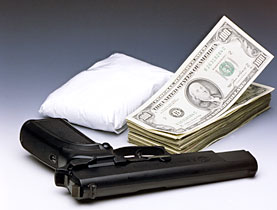Lausanne cops deal blow to Pink Panther thieves

The "exemplary" work of Lausanne detectives has led to the arrest of two men believed to be part of an international network of highly trained jewellery thieves.
French authorities said last week they had captured two “big fish” from the Pink Panthers, a group of ex-Yugoslav soldiers believed to have stolen more than SFr240 million ($216 million) in gems and watches from jewellers in 20 countries, including Switzerland.
The arrests of Nicolai Ivanovic and Zoran Kostic, two Serbs, at a discreet hotel in Paris last week came about thanks in part to quick detective work by Lausanne police.
A week earlier, the men had allegedly stolen dozens of watches worth at least SFr2 million from a boutique in Lausanne.
An investigating magistrate in Lausanne has now issued international warrants for the two, hoping they will be extradited to Switzerland to stand trial.
“No one was hurt,” an employee at the jeweller, l’Emeraude, told swissinfo.ch. “We haven’t done much else in terms of adding a guard outside because we already have a ton of security.”
But the robbers are known for staging fast, efficient heists and Hollywood-style getaways in which they virtually vanish without a trace.
Rarely does a holdup take more than 15 minutes. The l’Emeraude robbers were in and out in one minute, 47 seconds. To catch them, detectives knew they had to act fast.
Pink Panthers
Authorities say the group could be responsible for attacks all over Switzerland, including robberies in Lugano, Zurich, Schaffhausen, Geneva and Neuchâtel.
Swiss police have been working with Interpol for about two years contributing to a dossier on the Pink Panthers, a group that authorities say could involve as many as 150 people. Nearly all of them are Croats, Serbs, Montenegrins, and Bosnians who fought in the Balkans in the 1990s.
Police say the group is not organised like a crime family but is a network of cells responsible for hundreds of jewellery heists in as many as 20 countries over the past decade. They often move loot on the black market via various channels of clandestine international shipping.
The “Pinks” got their name after a robbery in London in 2004, when one thief tried to hide a blue diamond worth SFr850,000 in a container of face cream, just like in the classic Pink Panther movie staring Peter Sellers.
Elsewhere the thieves have been more brazen. In April 2007 they smashed cars into a shopping mall in Dubai and snatched $3.4 million in diamonds in broad daylight with plenty of witnesses filming. You can see their videos on YouTube.
In what was billed as the heist of the century, the gang hit the Harry Winston jeweller in Paris in 2006, when thieves absconded with sacks of rubies and diamonds worth SFr130 million.
“The modus was always the same,” Olivier Jude of the Monaco police department told the New York Times after jewellers across France lost nearly $10 million to the thieves. “Very fast, very well-organised with a plurality of perpetrators.”
A big arrest
The job in Lausanne bore the telltale signs of a Pink Panther raid. At 4.55pm on May 5, a well-dressed man walked into l’Emeraude and calmly asked about watches. As an employee opened a display case, an accomplice burst in and together the thieves reportedly made off with 94 luxury watches.
It happened so fast – in less than two minutes – that the workers in a pharmacy across the street told reporters they had not noticed anything.
Lausanne detectives also reacted quickly. They assembled security video footage, fingerprints and other evidence that allowed them to tip off French authorities within moments that the robbers were coming their way.
“The cameras showed two men who knew exactly what they had to do. They weren’t agitated and they left relaxed,” said Christian Pannatier, Lausanne’s police chief. “Thanks to good video images we were immediately able to see the robbers’ faces.”
Routine police work perhaps, but Lausanne detectives provided the new information to Interpol quickly. That proved key in arresting Ivanovic, 36, and Kostic, 38, who had procured tickets to fly back to Serbia with fake documents.
The men allegedly had two Swiss watches with them from the heist in Lausanne. The other watches had not been recovered.
“It was a big arrest that wouldn’t have been possible without the exemplary work of the Lausanne police,” a French detective told the Matin Dimanche newspaper on condition of anonymity.
“The arrests are a clear example of the results which can be achieved through law enforcement around the world cooperating,” said Jean-Michel Louboutin, Interpol’s executive director of police services.
“We congratulate the Swiss and French authorities whose collaborative efforts led to the arrests of these two dangerous individuals.”
Tim Neville, swissinfo.ch with agencies
Police believe there are 150 members or more in the Pink Panthers network, but the thieves work in small groups and have eluded authorities around the globe for about a decade. Some members are on Interpol’s “Red List” of most-wanted fugitives. Police say many members hold blue-collar day jobs to remain inconspicuous.
The group first began hitting jewellery shops in Britain, where Scotland Yard gave it its sobriquet after one thief placed a blue diamond in a jar of face cream, just like in the Pink Panther movie.
Their methods can be violent but also creative. They have painted park benches in front of shops they plan to rob to keep people from sitting down and becoming potential witnesses. At a robbery in Neuchâtel in April, the thieves, believed to be Pink Panthers, came dressed as painters.
The “Pinks” have used motorboats, Fiats, Audis and even a chauffeur-driven Bentley in their smash-and-grab raids. One of the more colourful incidents took place in 2003 in Courchevel. The robbers stole $2 million from a local jeweller at the French resort and then eluded police on skis.

In compliance with the JTI standards
More: SWI swissinfo.ch certified by the Journalism Trust Initiative











You can find an overview of ongoing debates with our journalists here . Please join us!
If you want to start a conversation about a topic raised in this article or want to report factual errors, email us at english@swissinfo.ch.